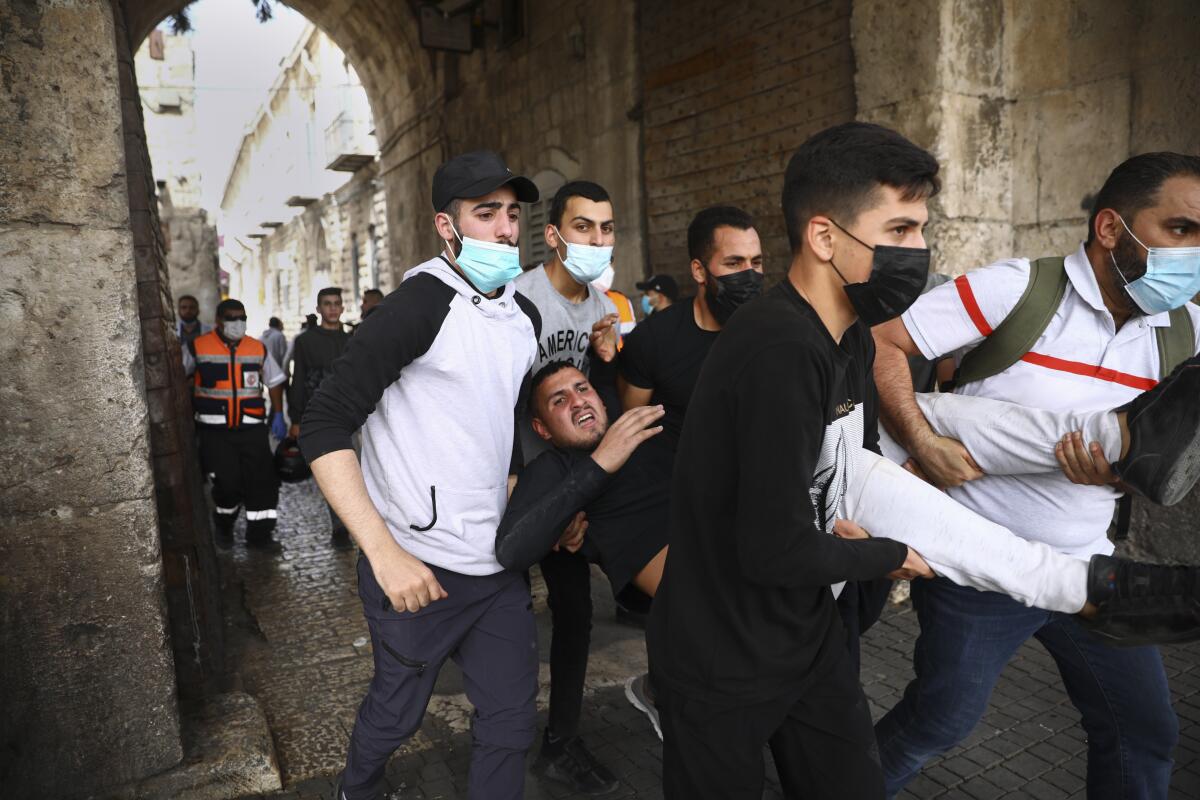News Analysis: Biden struggles to respond to Israeli-Palestinian violence after Trump refused to criticize Israel

- Share via
WASHINGTON — After four years of President Trump’s refusal to condemn or even mildly critique any Israeli act, the Biden administration faces soaring Israeli-Palestinian violence equipped with fewer options to deescalate tensions than at any time in recent history.
Trump gave carte blanche to the Israeli government of Prime Minister Benjamin Netanyahu and its right-wing nationalist supporters while sidelining and punishing the Palestinians.
For the record:
5:33 p.m. May 12, 2021This article mischaracterizes U.S. concerns about Israeli plans to evict several hundred Palestinians from their homes in East Jerusalem. While the Israeli government has suggested that is indeed the plan, the issue that U.S. officials were reacting to involves a single Israeli Supreme Court case on the evictions of several dozen people.
That policy has diminished Washington’s ability to influence either side, at least for now, in part because the Palestinians are wary, and in part because after Trump, any pushback by President Biden will be seen in some circles as an attack on Israel.
Israel continues its assault on the Gaza Strip as the U.S. and others call for a cease-fire.
In recent days, the White House and State Department have expressed “serious concerns” about Israeli plans to evict several hundred Palestinians from their homes in East Jerusalem to make way for far-right Jewish settlers. “As we have consistently said, it is critical to avoid steps that exacerbate tensions or take us farther away from peace,” one statement said. “This includes evictions in East Jerusalem, settlement activity, home demolitions and acts of terrorism.”
They added that a Hamas barrage of rockets fired into Israel was “unacceptable,” which they condemned in “the strongest terms.”
A volley of rockets
On Tuesday, the confrontation escalated, with Hamas militants launching steady volleys of rockets into Israel, including some that targeted Tel Aviv. Israel stepped up its battering of the Gaza Strip with continued airstrikes, sending missiles into buildings and other targets. U.S. Secretary of State Antony J. Blinken telephoned Gabi Ashkenazi, his Israeli counterpart, to urge deescalation.
The Biden administration’s public language has remained relatively mild and has not addressed what Palestinians say was excessive force used by Israeli police firing on the Al Aqsa Mosque, the third holiest site in Islam, during Ramadan prayers late last week and over the weekend. Israel also restricted Palestinian access to the hilltop site, further inflaming tensions, and has apparently allowed extremist Israeli settlers who attacked Palestinians free rein, according to Israel and Palestinian activists.
The violence between Israel and Palestinian militants goes on with an Israeli airstrike killing a Hamas commander and rocket fire from Gaza causing a death.
Trump’s support emboldened Israel in its plans for de facto annexation of large parts of the West Bank, “once creeping, now galloping,” as the Jerusalem Post put it. Palestinians claim the West Bank as a future independent state, but Israel has moved tens of thousands of Israelis into settlements that chop the territory into largely disconnected enclaves.

Feud over Jerusalem
Jerusalem has always been the most volatile tinderbox. Israelis and Palestinians both claim the holy city as their capital. Trump, breaking with decades of U.S. policy, formally recognized it as Israel’s capital in 2017.
The new plan to evict Palestinians from the Jerusalem neighborhood of Sheik Jarrah goes beyond just building housing for Jews and also dispossesses Palestinian residents.
“You change the status of U.S. policy on Jerusalem, you change the nature of the relationship and dialogue with one of the parties, you leave a legacy,” said Daniel Kurtzer, who served as ambassador to Israel and to Egypt under Democratic and Republican administrations. “They have not wanted to deal with this issue, and now the issue is back to bite them.”
Biden pointedly placed the intractable conflict low on his foreign-crisis to-do list when he came into office, and there is a host of reasons why Biden is treading carefully, analysts say. He doesn’t want to pick a fight with Netanyahu at a time Biden is trying to negotiate reentry into the Iran nuclear deal, which Israel adamantly opposes.
Palestinian protesters and Israeli police have faced off on a daily basis for weeks in and around Jerusalem’s Old City, a frequent site of conflict.
Biden must navigate between progressives in the Democratic Party who tend to favor more rights for Palestinians and traditionalists who are more pro-Israel. Biden must also consider the Democrats’ very narrow majority in Congress — any steps seen as anti-Israel provide Republicans with another club with which to bash the president and the party. Plus, his domestic policy agenda is already crowded with enormous challenges, from the COVID-19 pandemic and racial disparities to the economy and infrastructure.
“Biden’s approach is extremely minimalistic; he doesn’t want to ruffle Israel’s feathers,” said Khaled Elgindy, director of Palestinian-Israeli affairs at the Middle East Institute, a Washington think tank.
U.S. officials have reinitiated contacts with the Palestinians, but it will require time to reestablish trust eroded during the Trump years, diplomats said.
Although clashes between Israelis and Palestinians have ebbed and flowed over the years, the current surge threatens to escalate significantly without more decisive U.S. leadership. This week has seen the most lethal violence in years: more than 40 Palestinians killed in Gaza and hundreds wounded by Israeli police in Jerusalem, and five Israelis killed in a barrage of hundreds of rockets fired by Hamas into Israel and dozens of Israeli police and others hurt in clashes.
No ambassador
More than 100 days in office, Biden has yet to name a U.S. ambassador for Israel, and veteran diplomat Barbara Leaf has been nominated to become assistant secretary of State for the Middle East but has not yet had a confirmation hearing.
Perhaps more important, Trump dismantled the U.S Consulate in Jerusalem that catered to Palestinians and rolled back most aid programs, depriving Biden administration officials of “voices and eyes on the ground” to communicate with Palestinians and gather intelligence, said Ilan Goldenberg, a Middle East expert at the Center for a New American Security in Washington. “They’ve lost those points of impact and influence,” he said.
Leadership is also absent on the ground. Israel is struggling to form a government following four inconclusive elections in two years, and Netanyahu is on trial for corruption. The Palestinian Authority’s sclerotic and divided leadership has failed to hold any elections in decades.
U.S. administration officials insist they are engaged. Biden’s national security advisor Jake Sullivan spoke to his Israeli counterpart, Meir Ben-Shabbat, over the weekend. Israeli media reported that Sullivan’s tone was stern and Ben-Shabbat took umbrage at U.S. interference.
But there were signs Sullivan had some success. Israel’s Supreme Court postponed a ruling on the evictions, and Netanyahu changed the route of a potentially provocative march by religious nationalists through the Muslim quarter of the Old City.
All that was before Hamas began bombarding southern Israel with rockets, and Israel responded with airstrikes over the desolate Gaza Strip. Israel said more than a dozen Hamas militants were among the dead; Palestinian officials said the dead included 13 children. A Hamas role further complicates any diplomatic efforts because the U.S. lists the militant Islamic group as a terrorist organization.
Gilead Sher, for years one of Israel’s top negotiators with the Palestinians, said that it was a mistake for Biden not to give the Israeli-Palestinian conflict more importance earlier but that he can still wield considerable influence, if he chooses to use it, adding: “There are no bypasses to the Israeli-Palestinian conflict resolution.”
More to Read
Get the L.A. Times Politics newsletter
Deeply reported insights into legislation, politics and policy from Sacramento, Washington and beyond. In your inbox twice per week.
You may occasionally receive promotional content from the Los Angeles Times.














